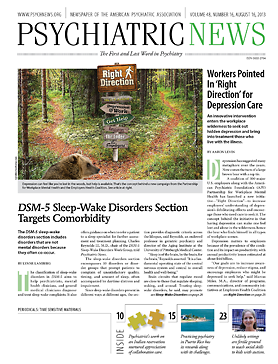At a workshop concerned with binge eating last year, Chevese Turner, the founder and chief executive officer of the Binge Eating Disorder Association, said that when she was little, her mother had anorexia nervosa and talked a lot about dieting. Both factors encouraged Turner to start binge eating, she believes (Psychiatric News, June 1, 2012).
Now a new study reinforces Turner’s assumption. It has found a link between parents’ discussion of weight with their adolescents and the adolescents engaging in unhealthy eating behaviors such as dieting, laxative use, and binge eating.
The study, headed by Jerica Berge, Ph.D., an assistant professor of family medicine and community health at the University of Minnesota, was published online June 24 in JAMA Pediatrics.
Berge and her colleagues first surveyed approximately 2,400 adolescents from 20 public middle schools and high schools in the Minneapolis/St. Paul area to determine whether they were overweight and whether they engaged in unhealthy eating behaviors. The adolescents came from diverse racial and ethnic backgrounds and were mostly from low, low-middle, and middle socioeconomic backgrounds.
The researchers then surveyed about 3,500 parents of the adolescents—50 percent of the adolescents had both parents surveyed—to learn whether the parents discussed weight or healthful eating with their youngsters and to see if there were any associations between parental conversations on these topics and adolescents engaging in unhealthy eating behaviors.
They found that such a relationship did exist.
For example, adolescents who were not overweight and whose mothers talked about healthful eating were significantly less likely to diet than were nonoverweight adolescents whose mothers talked about weight (27 percent versus 35 percent).
Similarly, overweight adolescents whose mothers talked about healthful eating were significantly less likely to diet than were overweight youngsters whose mothers talked about weight (40 percent versus 53 percent).
When their fathers talked about weight, nonoverweight adolescents were significantly more likely to diet than when their fathers did not discuss weight (33 percent versus 22 percent).
The findings were comparable for overweight youngsters. When their fathers talked about weight, 64 percent dieted, whereas when fathers talked about healthy eating, only 49 percent did.
As for the prevalence of binge eating, it was significantly lower among nonoverweight adolescents whose mothers didn’t discuss weight than among nonoverweight adolescents whose mothers did discuss it (4 percent versus 8 percent).
Similar findings emerged for overweight adolescents. The prevalence of binge eating was 9 percent in youngsters whose mothers didn’t discuss weight, but 13 percent in youngsters whose mothers did.
“These findings suggest that parents should avoid conversations that focus on weight or losing weight and instead engage in conversations that focus on healthful eating, without reference to weight issues,” Berge and her team concluded. “This approach may be particularly important for parents of overweight or obese adolescents.”
Psychiatrists can also “use the results of this study to guide their conversations with parents and adolescents about eating behaviors,” Berge suggested in an interview with Psychiatric News.
“I think these are important findings,” Michael Devlin, M.D., codirector of eating disorders research at the New York State Psychiatric Institute, told Psychiatric News. “They support the idea that despite our concerns about obesity and its comorbidities, the most useful health-promotion messages relate to lifestyle and not weight and that weight-related messaging—particularly messages that evoke shame or contribute to stigma—can be counterproductive. The next step would be to examine this cohort, or some similar cohort, over time to examine the longer-term ‘hard outcomes’ of medical risk factors, such as blood pressure, insulin sensitivity, blood lipids, and others, and the quality of life in groups exposed to weight versus lifestyle-related messages.”
The study was funded by the National Institutes of Health. ■

